Donald Trump's attacks on immigrants are unpopular. Here's how pundits got it wrong.
During the early stages of Donald Trump's authoritarian attacks on immigrants – as his henchmen snatched people off America's streets to disappear them without trial in foreign prison camps and he sent the military into American cities to intimidate and bully law-abiding Americans – pundits[1] were quick to insist that these overt acts of fascism were strokes of political genius, and that Democrats who spoke out against them were fools who would surely hand Trump a public opinion win.
For example, here's punditainer Chris Cillizza, on June 9:
Cillizza insisted, as is his hobby, that Democrats were blowing it because the public discourse around Trump's anti-immigration actions "clearly favors Donald Trump," explaining:
"Remember that Trump ran—expressly—in 2024 on getting MUCH tougher on illegal immigrants.
The consensus—especially among loose partisans and swing voters—was that the Biden administration had been ineffectual at the Southern border, largely because of its unwillingness to put in place real and biting policies that would curtail the flow of illegals into the U.S.
Even as Trump’s numbers have faded on virtually every issue during his first five months in office, his polling on the border and immigration more broadly has stayed strong."
"It’s a TOTAL no-brainer," Cillizza insisted, as if incredulous that Democrats could be so stupid as to oppose Donald Trump's attacks on immigrants. "Trust me, this is 100% a fight he wants. ... Politics, as I have said many times before, is about picking your battles. It’s about fighting on ground that is favorable for you—and unfavorable for your opponent. Democrats need to think this way if they want to beat Trump and the broader Republican party. Fighting Trump on ground where the public is clearly on his side makes ZERO sense."
Cillizza's piece was dated June 9. Donald Trump's net approval rating on immigration that day was a tepid +2.6 points. Over the next 18 days, Trump's net approval on immigration fell 7.4 points, to -4.8. Today, it stands at -4.4 percent, still 7 points lower than on June 9.
Here is Donald Trump's net approval rating on immigration this year, courtesy of G. Elliott Morris. I have annotated the data to highlight Cillizza's assurances of Donald Trump's invincibility on this issue.
Immigration isn't the only issue area in which the public is increasingly unhappy with Trump. But it is the only issue on which he was above water in early June, and he's now solidly underwater. Unsurprisingly, Trump's overall approval rating is also down since early June. From June 9 to August 21, Trump's approval rating dropped 3 points while his disapproval rating increased 2.2 points, for a decrease of 5.2 points in his net approval rating.
Remember: Pundits like Chris Cillizza insisted that because immigration was the one issue area in which Trump still enjoyed public approval, it was a "TOTAL no-brainer" that Democrats should avoid talking about immigration. "Fighting Trump on ground where the public is clearly on his side makes ZERO sense," he said. But what actually happened is that Donald Trump's support on immigration collapsed and his approval rating fell right along with it. Now, there are all kinds of caveats we can attach to that, most of which boil down to "causation isn't correlation," and that's true enough. But what's also true is that things played out precisely the opposite of the way pundits like Cillizza said they would. Instead of a good-for-Trump immigration fight propping up his overall approval, a bad-for-Trump immigration fight hurt his overall approval.
The simple explanation is that Chris Cillizza isn't very good at his job. That's true, of course, but it isn't the whole story. Nor is the explanation that Cillizza is generally predisposed to assume Democrats are screwing up and Republicans are political masterminds. To explain the more interesting part, I'll go back to one of the most vile and effective lies told during last year's presidential campaign, or any other.
Entering last fall's presidential debate, Donald Trump was in trouble. He had been leading Joe Biden in the presidential race, but when Biden stepped aside and Kamala Harris became the presumptive Democratic nominee in late July, she quickly jumped out to a small but sustained lead over Trump. On September 10, the day of the only debate between Trump and Harris, Harris held a four-point lead that had been growing for about ten days. (I'm using the Economist's poll tracker here because it's freely available; other public poll aggregators showed much the same thing: Trump had been leading Biden and was losing to Harris.)
Even more important than the polls, the campaign narrative favored Harris. I felt at the time that the several weeks leading up to the September debate was the most sustained stretch of a strongly favorable media/public discourse environment for a Democratic candidate since 2008. The feel of the campaign -- the energy of the campaigns themselves, the topics and tone of media coverage and public discussion -- favored Harris. And then the candidates met on stage in Philadelphia and Kamala Harris absolutely thrashed Trump:
That should've been the dominant story for the next week, at least: The candidates met on stage in front of a massive television audience and Kamala Harris and Donald Trump both made Trump look like the abhorrent madman he is. But that isn't how it turned out.
The dominant story for more than the next week was about Haitian immigrants eating pets, though they were not in fact doing so. On September 9, the night before the debate, odious lickspittle JD Vance spread the lie peddled by "far-right activists, local Republicans and neo-Nazis" that Haitian migrants in Springfield, Ohio were stealing and eating their neighbors' pets. Over the next few days, Vance, Trump, and their allies would continue to spread that vicious, dehumanizing lie -- and the news media privileged their lie, making immigration the dominant story for more than a week coming out of the debate.
When a news report treats the truthfulness of a lie as an open question, it privileges the lie. When a news report devotes more and more prominent space to recounting the lie and the liar’s defense of it than it does making clear that it’s a lie, the article privileges the lie. When a news report focuses on the target of a lie’s struggle to deal with the impact of the lie, the article privileges the lie. And when a news report focuses on the topic of the lie — even if it does a good job of making clear the lie is a lie — it privileges the lie, because it allows the liar to set the topic of conversation, and thus increases the electoral salience of a topic the liar believes is to his benefit.
That’s what the news media has done over the last week. The news media surely affects what people think, but it has a larger and more powerful effect on what people think about. So even as the media has done a better-than-usual job of debunking the Trump-Vance lies, it has privileged those lies by helping Trump and Vance increase the salience of immigration, an issue the Trump-Vance campaign believes helps it.
That’s what the news media is doing right now: Given the Trump-Vance lies oxygen. Helping them set the terms of the campaign, by making centering the issue — immigration — they want centered.
All these stories debunking Trump’s lies have kept one of his central campaign themes at the forefront of campaign coverage. They have privileged and rewarded Trump’s lies.
I think that was a much more powerful turning point in the 2024 election than is widely understood. In place of a week of news coverage of Harris's superlative debate performance and Trump's dismal performance, we got a more than a week of media coverage increasing the salience of immigration, one of Trump's preferred areas of focus. That extended streak of several weeks of a relatively favorable information environment for Harris came to a premature end, never to return.[2] Harris's lead stopped growing and started shrinking. And immigration played a role: In a September 18-20 YouGov poll, immigration tied for second among most important issues to registered voters, and "border enforcement" was the most important immigration-related issue tested -- and far more registered voters trusted Trump to handle immigration than Harris.
There was polling at the time that suggested few Americans believed the Trump-Vance-neo Nazi lie that immigrants were eating pets, so many people concluded the lie hurt Trump and Vance. I think it helped them. The lie -- and the news media's coverage, which privleged the lie -- helped them shift the focus of the campaign to an issue that there is ample reason to believe was advantageous to them.
Note that I'm not saying I think immigration is inherently advantageous to Republicans. I think it was advantageous to Republicans in 2024. It was then, as Chris Cillizza says it is now, "fighting on ground that is favorable for [Trump] — and unfavorable for" Democrats.
That brings me to the big thing pundits like Cillizza who assume everything is advantageous to Trump and the GOP are missing: Donald Trump is in power now, and that affects how the public reacts to him.
When Donald Trump isn't president, when he's merely running for president, he benefits from public concern about all kinds of issues, from immigration to inflation, because he has no responsibility for them. He can talk about how bad things are, and that will resonate with a lot of people. Many of those people will assume Trump's "solutions" to those problems won't be as disastrous and inhumane as Democrats claim. "Trump won't really do all the crazy and evil things Trump says he will do" is a deeply entrenched assumption among a lot of voters. But when Trump is president, he actually does the crazy and evil things. And voters don't like them!
A nontrivial number of voters who last year perceived immigration as a big problem Joe Biden and the Democrats were failing to solve or perhaps even making worse now see immigration as something Donald Trump is using as a pretext to harass their neighbors and terrorize their neighborhoods. They see tanks rolling down Americans streets and people kidnapped by masked gangs. And they don't like it.
Oh, and Chris Cillizza? He hasn't written about immigration politics since that June 9 piece. No sheepish updates on Trump's declining immigration poll numbers since then. But he did just publish essentially a carbon-copy making the same argument that Trump's authoritarian takeover of U.S. cities is great politics for Trump, for all the same reasons. Like a stopped clock, he can't see when times change.
And some Democrats. ↩︎
These things are fragile, particularly when you don't have the benefit of a massive ideological media ecosystem like the GOP has. ↩︎
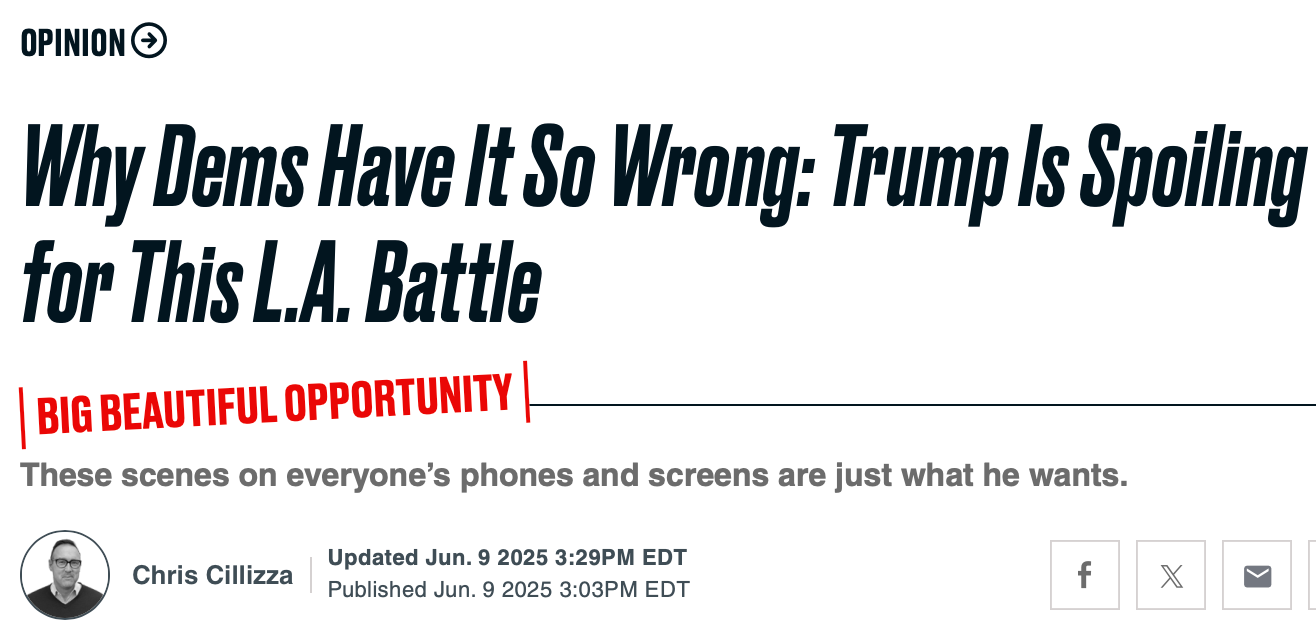
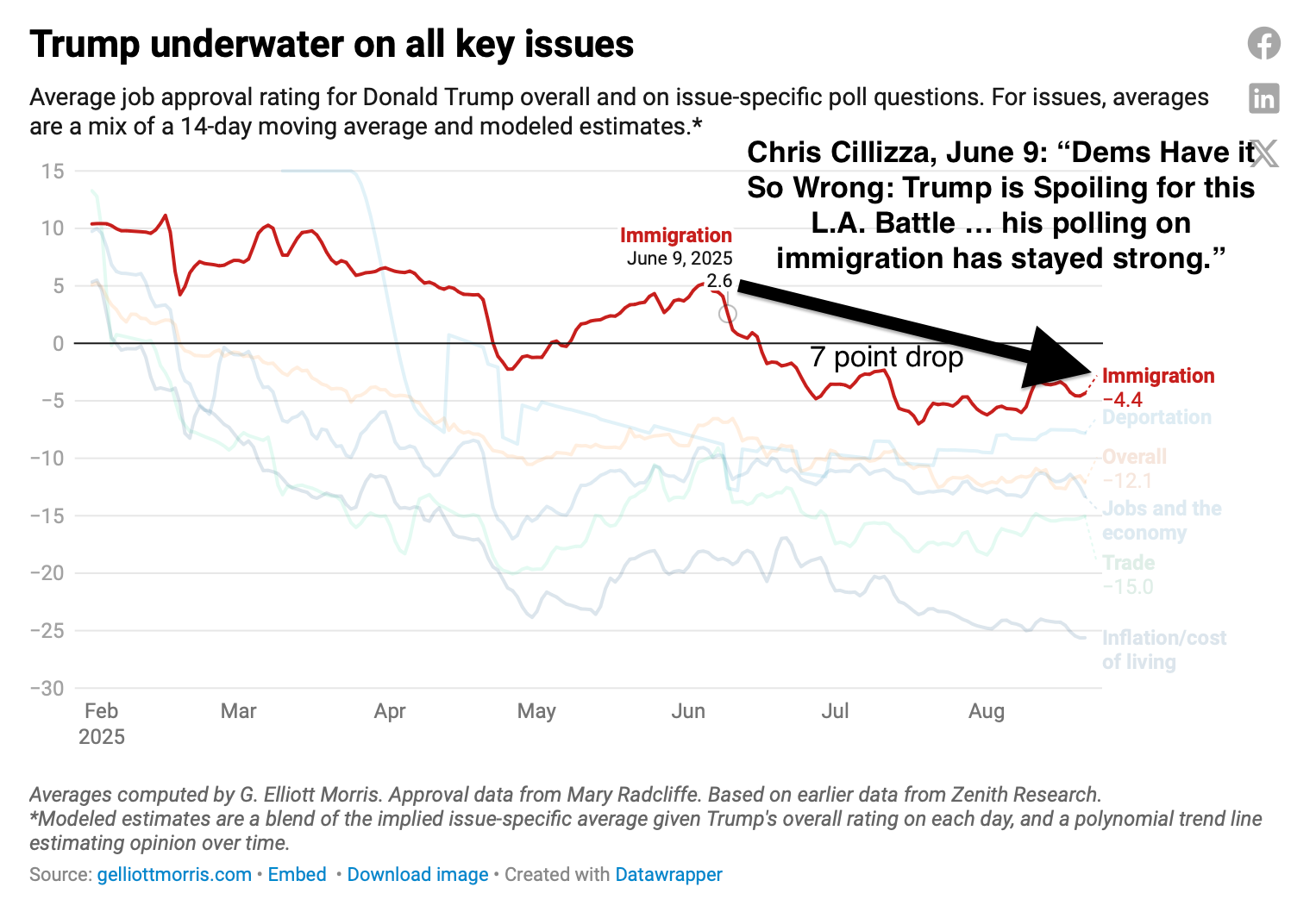
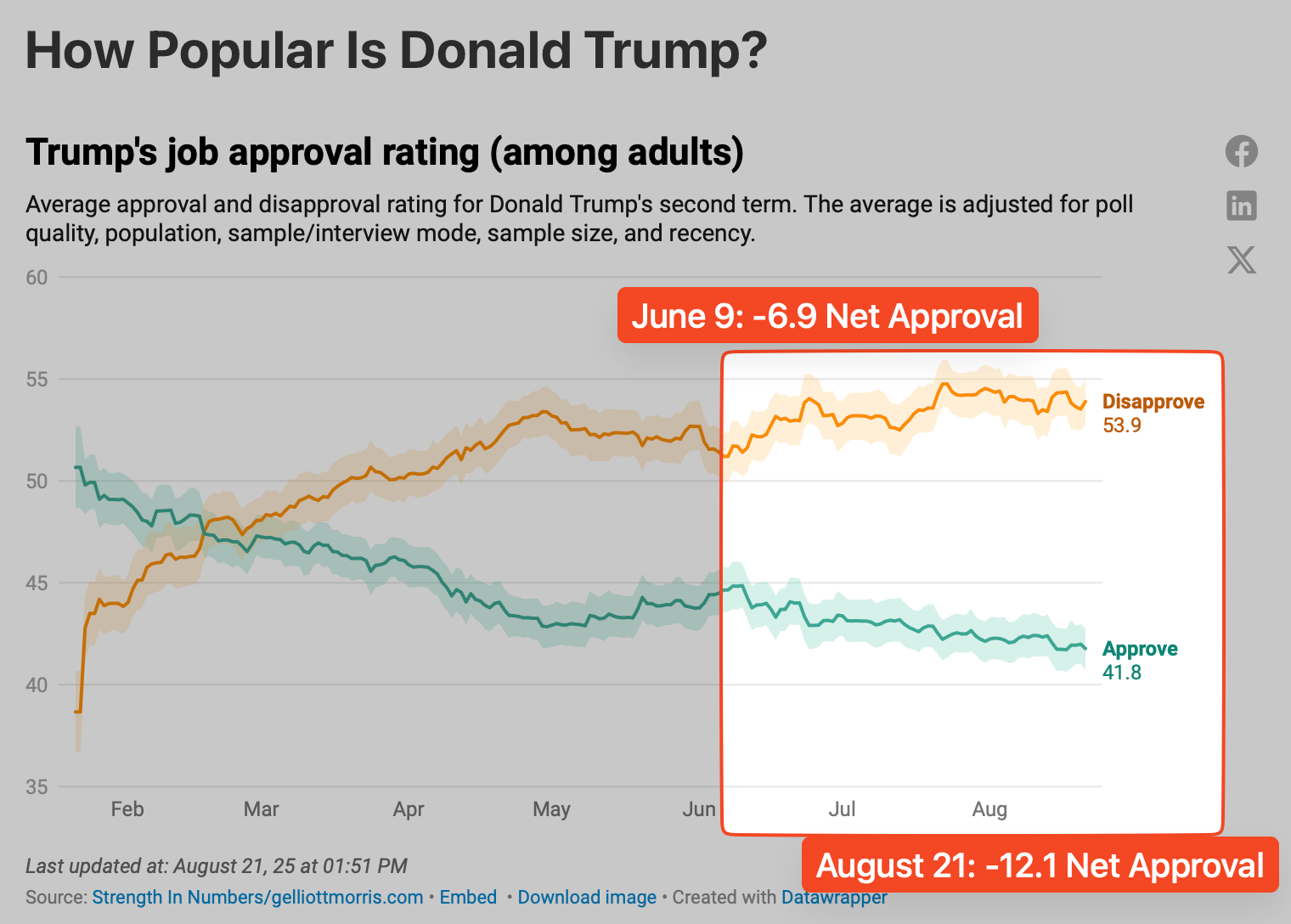
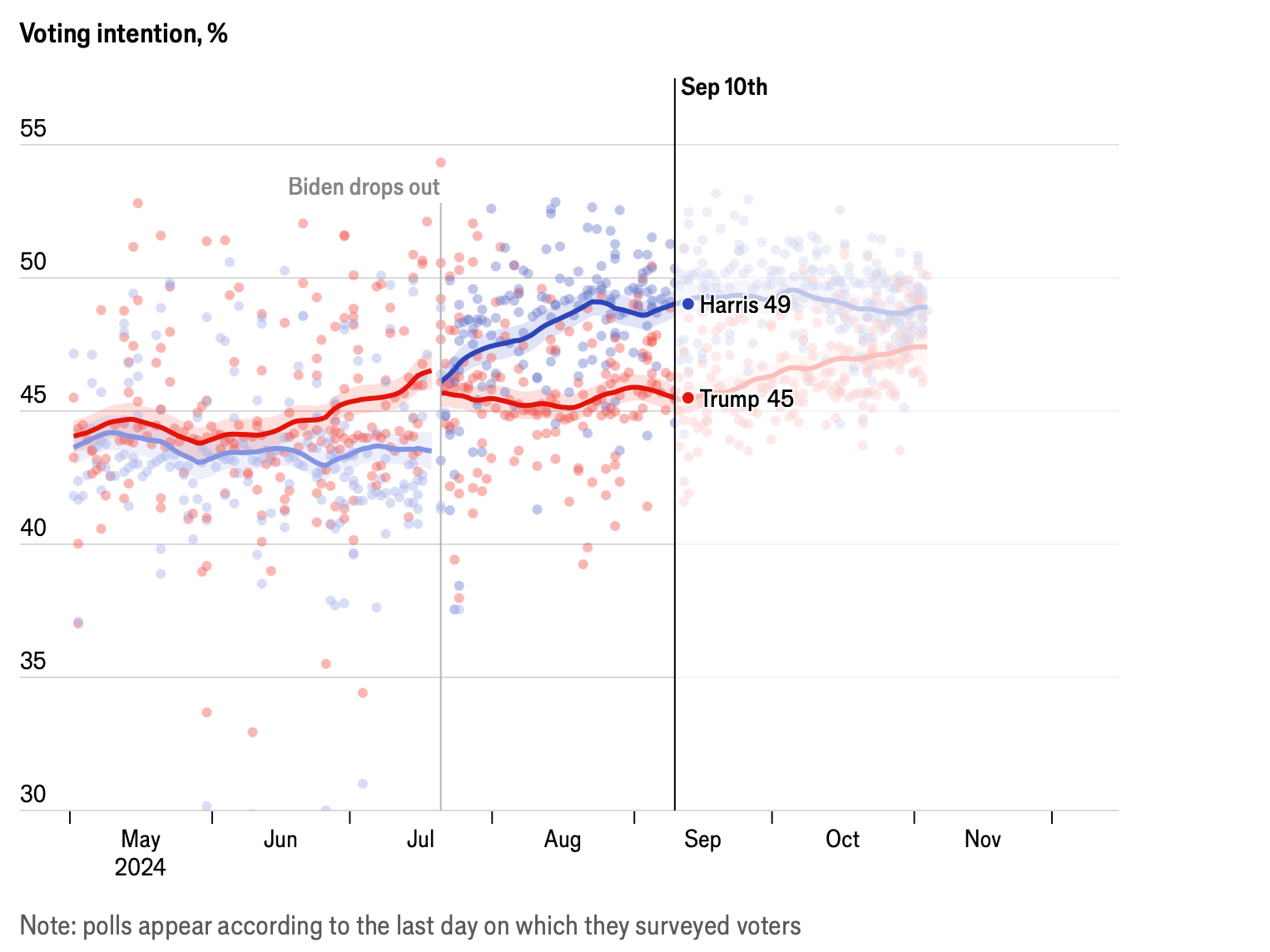
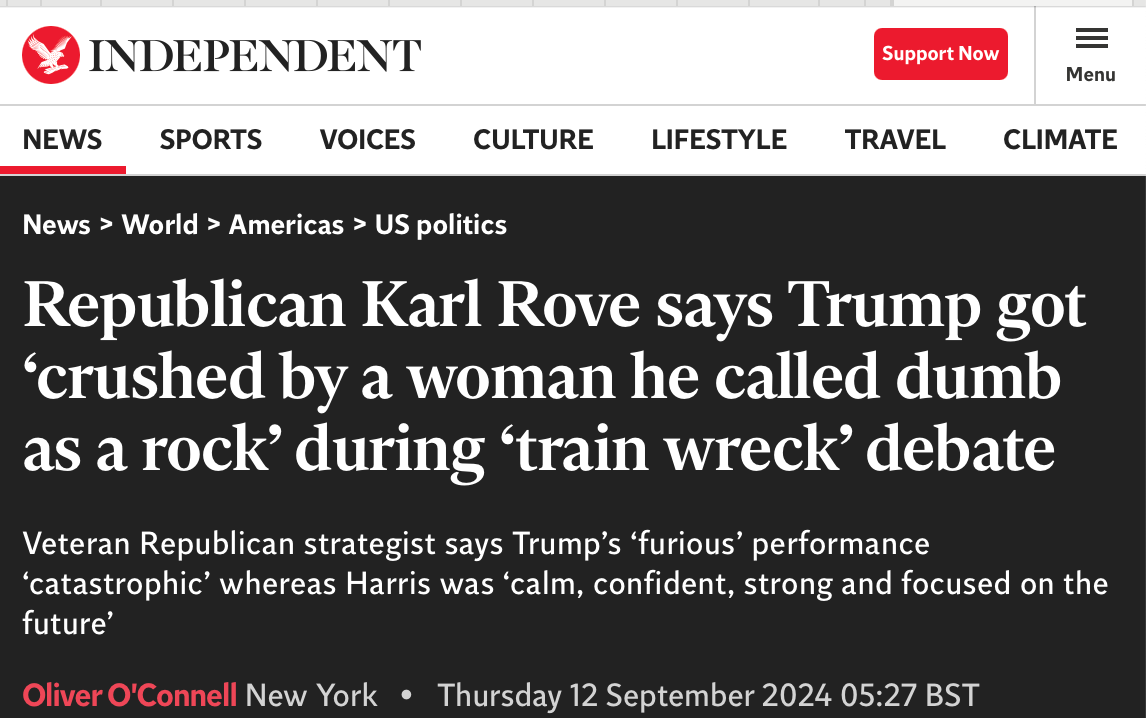
Member discussion